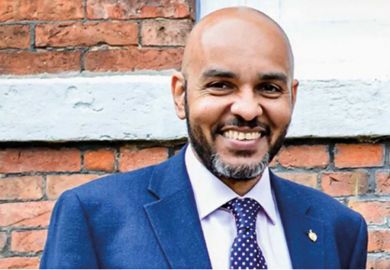One of the UK university sector’s few black leaders is hoping to build a better pipeline of ethnic minority academic staff, via almost two dozen new PhD studentships.
The 23 fully funded studentships at Birmingham City University would offer aspiring researchers a tax-free doctoral stipend for up to 42 months, plus a full fee waiver, said vice-chancellor David Mba.
While a majority of BCU’s students come from ethnic minority backgrounds, that diversity is not represented in the staffing body that Professor Mba inherited when he joined the institution last October.
“The idea is that we transition [students] from PhDs into teaching fellows and ultimately onto the teaching body,” he told Times Higher Education.
“It very much speaks to that – not just the students we want to support but the pipeline of academic staff that we want to have in our classrooms.”
Post-completion, PhD graduates will be encouraged to apply for BCU research and teaching opportunities to further develop their academic expertise.
Another way to boost representation within an institution is through direct recruitment, but Professor Mba said he was concerned that this would only cause problems elsewhere in the sector.
Campus resource collection: Being black in the academy
“You can hire staff from elsewhere, but that doesn’t actually solve the problem – it just shifts it from one place to the next,” he added.
“We need to think holistically and longer term about ensuring that we attract different types of groups into the staffing body.”
Though there was no “quick fix”, Professor Mba said he hoped that schemes such as this would go some way to improving the well-known lack of diversity among UK academic staff.
And, ultimately, some might choose to follow Professor Mba, former deputy vice-chancellor for research, knowledge exchange and enterprise at the University of the Arts London, into academic management.
“You hope that people who come into HE from minority groups might ultimately want to go into management – not everybody does,” he added.
“It’s about creating the opportunities – I might lose some of them who want leadership positions elsewhere, but that’s fine; someone else will benefit from having a more diverse leadership staffing base.”
The PhD studentships will be available in each of BCU’s specialist subject areas: arts, design and media; business, law and social sciences; computing, engineering and the built environment; and health, education and life sciences.
They are open to all students, but applications from groups that have been historically under-represented in doctoral study are particularly encouraged.
The deadline for applications is 30 April. Successful applicants, who will enrol in September 2024, will also have the opportunity to gain transferable skills and opportunities to develop their professional expertise by undertaking paid teaching activity and joining research groups.
Register to continue
Why register?
- Registration is free and only takes a moment
- Once registered, you can read 3 articles a month
- Sign up for our newsletter
Subscribe
Or subscribe for unlimited access to:
- Unlimited access to news, views, insights & reviews
- Digital editions
- Digital access to THE’s university and college rankings analysis
Already registered or a current subscriber?







